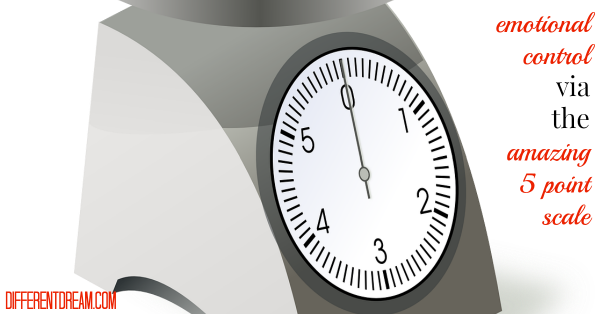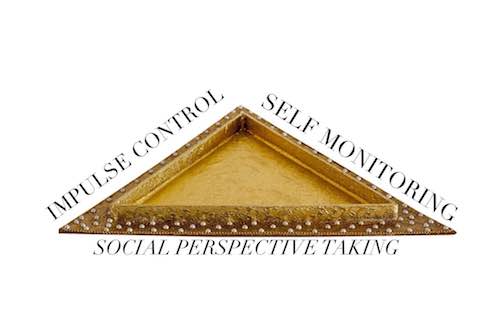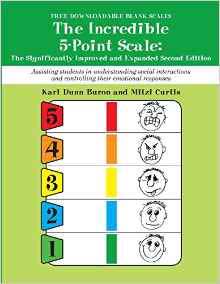Emotional Control Via the Amazing Five Point Scale

Please welcome guest blogger Ruth Stieff back to Different Dream. Ruth is an ABA therapist and the owner of One Piece LLC. She and her husband are the parents of a young adult son who lives with autism. Today she’s blogging about how to encourage emotional control in kids with special needs by using an amazing, user-friendly five point scale.
Emotional Control Via the Amazing Five Point Scale
As a mom and in my work as a behavioral service provider, I have seen a few hundred temper tantrums and meltdowns. I used to think the two types of behavior were the same thing.
Not any more.
After my third child was born and eventually diagnosed with an autism spectrum disorder, I observed crying, whining, yelling and stomping about the smallest irritations. This behavior went on for years.
These were true meltdowns.
Other children developed emotional regulation in the preschool years, but my son was in second grade before the meltdowns led to his diagnosis. His lack of emotional control led us to seek professional help to understand what was going on.
What Emotional Control Is and Isn’t
We learned that emotional control was a set of self-regulation skills between inhibition and initiation. We also learned the difference between inhibition and initiation.
- Behavior inhibition can’t stop when asked
- Cognitive inhibition includes daydreams and being off topic,
- Behavior initiation is getting started with something different
Why Emotional Control Is Important
There is a movement to allow children with diagnosed disabilities to be accepted for exactly who they are. I wanted that for my son as well. I knew he would not grow out of autism and he needed people to accept him and his uniqueness. At the same, he needed to develop just like any other child to reach his full potential. Emotional control was one area he needed to grow and develop in order to progress in many other areas.
Areas That Affect Emotional Control
Emotional control is a crucial building block to all executive functioning skills including attention, working memory, organization, planning, and problem solving. There are 3 areas that affect a person’s abilities to control emotion. Key skills essential to the development of emotional control are illustrated on this triangle.

Developing Emotional Control Via the Amazing Five Point Scale
For many years, I looked for interventions that would help my son and others develop emotional control. One “go to” resource that helps children learn skills is the Amazing Five Point Scale. This scale looks like a thermometer and helps child, especially visual learners, develop a plan and visual cue for self-monitoring emotional control.
It does not specifically target perspective taking but it incorporates understanding what behavior should be in various situations. Once a child understands what the socially expected behaviors are, it’s easier to teach social perspective taking. This can be done with talking and thought bubbles.
- When I do this, is that what I should be doing?
- If the child isn’t doing what is appropriate or socially expected, what impression is he making to others?
- How is this affecting others?
- Could this be pushing potential friends away?
More Resources for Teaching Emotional Control
Kari Dunn Buron, author and creator of the Amazing 5 Point Scale has a website that explains the whats and whys of the scale. When teaching the scale, I define each of its parts using the number and color. In my experience, yellow/3 is the crucial aspect for children to understand. I explain it as looking great on the outside because of behavior, but not feeling okay on the inside, barely able to hold your behavior/emotions together. Once children can identify what yellow/3 feels like and how to move down the scale, most kids make progress developing emotional control.
Your Experience with the Amazing 5 Point Scale
I would love hearing others’ experiences with using the Amazing 5 Point Scale to teach children emotional control.
Do you like what you see at DifferentDream.com? You can receive more great content by subscribing to the quarterly Different Dream newsletter and signing up for the daily RSS feed delivered to your email inbox. You can sign up for the first in the pop up box and the second at the bottom of this page.
By Ruth Stieff
Ruth Stieff is a wife, mother and owner of One Piece LLC . She is passionate about helping children with learning differences make progress and helping parents normalize family life.
Subscribe for Updates from Jolene
Related Posts
The Lessons I Learned while Raising a Child with EA/TEF
Jolene Philo reflects on a lifetime of lessons learned while raising a child with EA/TEF and shares the insights she’s won.
Looking Back at Your Child’s EA/TEF Journey
Looking back at your child’s EA/TEF journey can give parents a new perspective about past events. Guest blogger Maggi Gale shares how her look back clearly showed her how God was with their family during their daughter’s very unusual first weeks of life in 2002. Three...
How Do I Let Go of My Adult EA/TEF Child?
Valeria Conshafter explores the question “How do I let go of my adult EA/TEF child?” for EA/TEF Awareness Month.







0 Comments